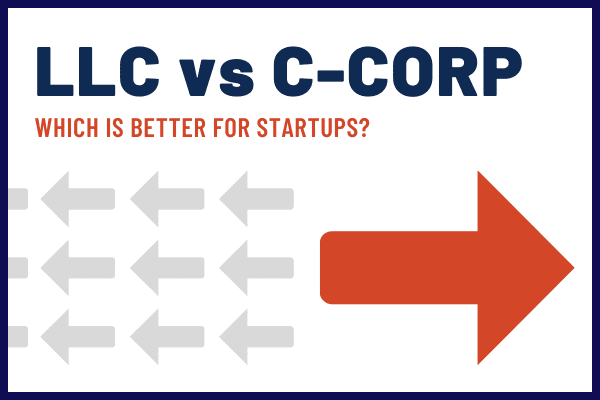When creating a new startup, one of the first—and most important—questions you’ll need to address is how to structure it. Which is better for startups: an LLC or C-corp?
Many sources will tell you that C-corporations (C-corps) are the best option for startups looking to raise outside capital. In fact, many investors prefer C-corps so much that they’ll force startup founders to convert their business to a C-corp as a condition of investment.
But in reality, an LLC may be the winning business structure for many startups. Here are 3 reasons why.
1. Most startups never become profitable
A majority of startups shut down without ever turning a profit. In fact, even giant startups worth billions of dollars, like Uber or Spotify, are losing money.
A startup that’s structured as a C-corporation can carry losses forward—meaning that if the company starts making profits in the future, the prior losses can be used to offset the tax burden that comes with making money.
But this tax benefit assumes the company will be profitable someday. For a majority of startups, that’s not the case.
Meanwhile, the owner of a startup LLC can take advantage of pass-through taxation. This means that the company’s profits and losses pass through to the owner’s individual tax return each year. If the company is losing money, the owner can enjoy tax savings every year—no waiting required.
One study claims that investors in C-corp startups lose significant funds to taxation compared to what they would pay if they invested in LLCs instead. Across the study participants, the additional taxes paid totaled 4.9% of the amount invested.
2. LLCs can still offer equity-based compensation
Startups typically offer equity (ownership) to investors, founders, and early employees in the form of stocks or shares. The hope is that the startup will become worth a lot of money and the shareholders will be able to sell their equity for a significant profit.
We’re often asked if LLCs can issue stock, and the answer is yes—kind of. Even though LLCs don’t have stock or shares to give out, they can still offer equity-based compensation. In fact, the options for doing so are extremely flexible and customizable.
It is true that compared to a C-corp, an LLC will require a little extra red tape when it comes to adjusting equity agreements (for example, when new investors come on board). But this inconvenience is usually outweighed by the tax benefits of an LLC.
3. It’s easy to convert an LLC to a C-corp when the time is right
Many startup founders choose the C-corp structure in anticipation of going public with an IPO (initial public offering). Unlike private investment, an IPO requires having shares to sell—and, as we already mentioned, that’s not an option for an LLC.
However, it’s relatively easy to convert an LLC to a C-corporation when the time comes. The process typically doesn’t involve any unfavorable tax implications.
Most startups never make it to the IPO stage. So, considering the tax savings available through an LLC, it makes sense to hang onto the LLC business structure for as long as possible.
Of course, the startup world is used to C-corps, and founders may be at the mercy of investors when it comes to their business structure. But depending on the situation, going against the grain and choosing an LLC for your startup can result in significant tax savings for founders and investors.
Need help choosing the right business structure for your startup? The team at Gordon Law Group includes experienced startup attorneys and tax attorneys who will make sure your business is set up to maximize savings from every angle! Contact us online to get started.




